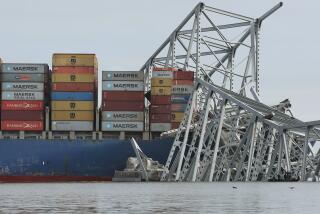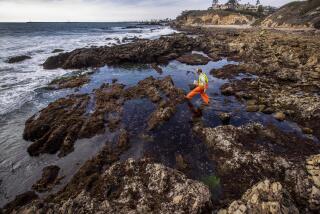More Preventable Spills
- Share via
The weekend rash of oil spills in Rhode Island’s Narragansett Bay, the Delaware River and the Houston Ship Channel could have been worse. The volume of oil spilled was not as massive as first feared. Natural forces aided in both the dispersal of the spills and in the cleanups. But another way of looking at the incidents is that they should not have happened in the first place, just as the Exxon Valdez spill should not have happened.
The Greek tanker that struck a marked reef at the mouth of Narragansett Bay was sailing without a port pilot; it should have had one. The Uruguayan tanker that ran aground in the Delaware strayed off course after an anchor accidentally was dropped. In Texas, a Panamanian tanker and a barge collided. All of these accidents most likely could have been preventedif the three busy waterways had more diligent tanker traffic-control systems. The amount ofoil spilled could have been minimized if the tankers had been built with double hulls.
The other lesson of the weekend was that, no matter what the oil companies contend, the nation cannot count on spill containment to offset negligence along the waterways. The spills totaled only about one-tenth the volume of the Exxon Valdez accident, containment gear arrived on the scene faster, but it still was not adequate for either the Rhode Island or Delaware River incident. By Monday morning, only one-third of the Texas spill had been sucked up by vacuum machines.
The Coast Guard cut back on ship traffic- control operations in recent years as its budget was shifted toward drug interdiction. But at least the Coast Guard recently has begun the first nationwide review of traffic control in 15 years. Congress should direct it to modernize its traffic control program and then give it the funds to do the sort of job that will prevent such eminently preventable accidents from happening again.
More to Read
Sign up for Essential California
The most important California stories and recommendations in your inbox every morning.
You may occasionally receive promotional content from the Los Angeles Times.













